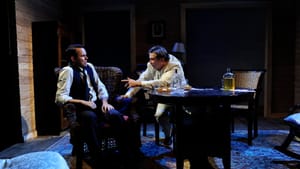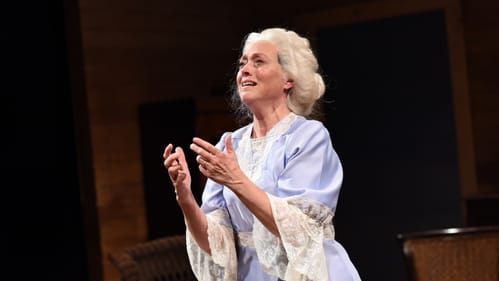Stay in the Loop
BSR publishes on a weekly schedule, with an email newsletter every Wednesday and Thursday morning. There’s no paywall, and subscribing is always free.
Don't go gently
Quintessence Theatre Company presents 'Long Day's Journey into Night'

Quintessence Theatre Group, the Germantown company devoted to producing classics, continues to expand in its eighth season. Artistic director Alexander Burns decided to add U.S. classics to their repertory moving forward (though they produced Eugene O'Neill's Mourning Becomes Electra in 2014). This time, they chose one of the most challenging: O'Neill's autobiographical tragedy Long Day's Journey into Night.
The play's history adds to its reputation. O'Neill demanded that this last play not be made public for 25 years after his death (in 1953) and that it never be performed, but his wife overrode his instructions two years after his passing. It won his fourth Pulitzer Prize and is regarded one of the 20th century's finest U.S. plays.
The play's reputation precedes it in other ways. At nearly four hours, Long Day's Journey into Night is daunting for both theater artists and playgoers. It requires extraordinary effort from its four central characters: patriarch James (Paul Hebron), wife Mary (E. Ashley Izard), and sons Jamie (Josh Carpenter) and Edmund (James Davis).
Up-Close Tragedy
Burns's production succeeds in large part because these characters are rendered with such detail that their alcohol-fueled arguments and recriminations never feel repetitive (even when they are) or superficial. The play unfolds in layers, exposing not only the family's present miseries, but how their mistakes and shortcomings led inexorably to this point.
"Forget the past," James tells Mary.
"How can I?" She responds. "The past is the present. It's the future too."
Long Day's Journey plays in a small, rustic living room in the Tyrones' Connecticut summer house, the audience only a few feet away. James's obsessive cheapness shows in the mismatched furniture, rough-hewn walls and floors, and lack of decoration in Burns's naturalistic set. The only adornment is a small Shakespeare portrait, a constant reminder of James's doomed artistic ambitions. Instead of becoming one of his generation's great classical actors, he pursued fame and fortune playing one popular role for decades, typecasting himself forever — much as O'Neill's father did.
Ellen Moore's lighting makes early scenes ironically sunlit, then achieves the play's descent into darkness with sculpted pools of hazy light. Jane Casanave's period costumes feel too new and could better suggest James's frugality. Burns's subtle sound design helps suggest the oft-mentioned fog, making it more emotional than literally atmospheric; a distant foghorn speaks eloquently.

Drunk and angry
The house's stairs, set off of stage right, suggest a long climb to another world where Mary's morphine addiction rules. Izard's Mary is a most sympathetic monster, rhapsodizing about opiates' soothing effects while spitting accusations. "I never knew what rheumatism was," she says to Edmund, "until after you were born." Her shock of white hair suggests a sudden decline, which Izard makes convincingly multileveled. "She watches us watching her," Jamie remarks, and we see it.
Hebron's James is believably the stage actor, indulging in stentorian fits of anger as if frustration is his favorite role, then rushing to apologize. Beneath Carpenter's sneering contempt for everyone, including himself, is flailing regret. "I love you more than I hate you," he tells Edmund, the extremes warring within him. Davis's Edmund (O'Neill's surrogate, though in the play he was conceived to replace a dead child named Eugene) struggles with consumption and self-hate.
All three men drink throughout the play's daylong journey, starting at breakfast. Even servant Cathleen has a tipsy scene, which Cassandra Nary performs ably. There are many types of inebriation, just as anger has many shades, and Burns's fine cast doesn't settle for stereotypes.
Jean-Paul Sartre famously said that "hell is other people." For O'Neill, especially in Long Day's Journey into Night, hell is family. Burns wisely doesn't cut or rush the play, and even allows necessary, meaningful silences. That the Tyrones' claustrophobic battles are harrowing is to be expected; that they're so engrossing is a testament not only to O'Neill's talents, but to Quintessence's maturing skills.
What, When, Where
Long Day's Journey into Night. By Eugene O'Neill, Alexander Burns directed. Quintessence Theatre Group. Through October 22, 2017, at the Sedgwick Theater, 7137 Germantown Avenue, Philadelphia. (215) 987-4450 or quintessencetheatreorg.
Sign up for our newsletter
All of the week's new articles, all in one place. Sign up for the free weekly BSR newsletters, and don't miss a conversation.

 Mark Cofta
Mark Cofta